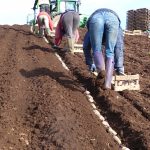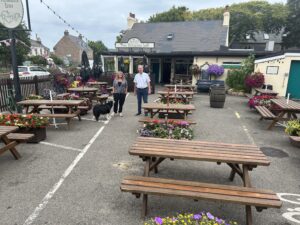
We continue our series of articles in Jèrriais – Jersey’s own traditional native language. The ‘frouque’ in question is a digging fork, rather than a table fork. An English translation follows.
This contribution comes from Jean Le Maistre. We commend it not only as an exercise in Jèrriais, but as a reflection on the Jersey Royal season by a former president of Jersey’s Agriculture committee.
j’pense qué j’dévthais entanmer acouo eune aut’ fais lé sujet dé l’agritchultuthe.
Chein tchi m’a fait y penser dreinement ch’est d’aver apèrchu cèrtains clios d’patates à l’entou d’nous ichîn à Millais. Ch’tait triste dé les vaie, p’t-être manque dé plyie ou même du pousse-tchu. J’peux faithe servi chutte expression-là pa’ce qu’oulle est dans l’dictionnaithe et l’explyicâtion donnée est…….. Ch’est dé l’engrais tchi fait pousser vite des récoltes, comme, par exempl’ye, des patates! Cèrtainement ils ont l’air d’aver lé haînu.. qu’est un autre mèrveilleuse expression. Èrgardez, bouonnes gens, dans l’dictionnaithe…ch’est mèrveilleux de pouver dêcouvri, dans des p’tites carres, ches expressions si riche! Ch’est vraîment dé l’or ou p’t-être des p’tits diamants qué nou trouve dé temps en temps dans nouotre ancienne langue.
J’pense souvent comment qué tout l’travas sus les fèrmes a changi dans ma connaîssance dépis la dgèrre. Quâsi tout ’tait fait à la main sinon pouor les grandes tâches tch’étaient résèrvées au j’va ou tchiquefais ès j’vaux. Pouor touônner la terre ch’tait au j’va et pis la hèrchéthie, lé griffonâge et la houett’ie pour les patates, étaient auve lé j’va. Mais i’ y’avait tchiques exceptions quand nou griffonnait et houettait un rang à la fais, ch’tait tchiquefais à la main, et bouonnes gens, ch’tait du travas hardi dû.
Quand nou v’nait à foui les patates ch’tait à la main auve la frouque. Nou-s-avait tchitch’un à êtèrrer et pis lé traîsième gliainer les patates dans un pangni. I’ fallait les vèrser douochement dans un p’tit bathi, tout prêt pouor les vendre ès marchants en Ville et pis les exporter par baté envers lé marchi en Angliétèrre. Au jour d’aniet, quâsi tout chu travas-là sé fait à la machinne, sinon p’t-être à la pliant’tie. I’ c’menchent à utiliser les machinnes à plianter auve de bouôns résultats, qué j’ai oui!
Mais j’ai grand pitchi quand j’vais les travailleurs tchi sont à pilvâtchi parmi les patates quand i’ sont à remplyi les grandes boêtes sus lus tchithiots. Éventuellement tchitch’un s’en vont acater ches patates-là pouor les mangi! J’mé d’mande, s’en vont-ti èrtouônner eune deuxième ou traîsième fais pouor acater nos belles Rouoyales ou s’en vont-ti acater des Angliaîches à la pièche, tch’ont l’air d’être fraîches? Seux certain ch’est chein tch’ils appellent “lé progrès” mais pouor dé mé, nou risque dé tuer nouotre marchi. Nou vèrra sans doute et j’espéthe qué j’sis pas correcte.
J’comprends hardi bein qué tout est chi au jour d’aniet mais j’n’ai jamais veu autant d’côtis abandonnés à l’Êta comme ch’t ’année ! Et en pus, i’ y’a deux’trais clios à l’Êta tchi n’ont pas té tchultivés. P’t-être qué ch’tait à cause dé la plyie au c’menchement d’ l’année, tchi vînt à pliein dans la pliant’tie. Quand ch’la s’arrive ch’est împossibl’ye dé faithe grand-chose et j’ai r’gret pour les fèrmièrs tchi s’trouvent dans ches conditions là. Mais I’ faut tréjous vivre en espéthance qué l’affaithe es’sa mus l’année tchi veint. J’lus souhaite bouonne chance pouor lé reste d’la saîson et pouor l’année tchi veint.
English translation:
I think I should ‘open up’ again the subject of agriculture.
What has made me think about it again recently is having noticed some fields of potatoes around us here in Millais. It was sad to see the potatoes, perhaps through lack of rain or perhaps of fertiliser. I can use such an expression as it is in the dictionary and the explanation given is…… it is fertiliser which makes crops grow fast, as for example potatoes. Certainly they look as though they have suffered or are stressed…….. which is a good Jèrriais expression. Have a look good people in the dictionary…..it’s wonderful to be able to discover, in some small corners these rich expressions. It really is “gold” or perhaps even diamonds that one can find from time to time in our ancient language.
I often think how all the work on the farms has changed, as I understand it, since the war. Nearly everything was done by hand except for the large tasks which were undertaken by the horse or even sometimes by horses.
Ploughing the land was with a horse and then scarifying in differing forms and then ‘banking’ potatoes was with a horse. But there were exceptions when we scarified and ‘banked’ one row at a time it was sometimes by hand and that was really hard work.
When we came to ‘lifting’ the potatoes it was all by hand with a fork. We had someone to ‘shake’ the stalks and the third one would pick up the potatoes in a basket. We had to tip them very slowly into a small barrel, ready to sell them to the merchants in town and then export them by boat to the markets in England.
In today’s world nearly all this work is done by machines, except perhaps for planting. They have started using planting machines with good result, so I gather.
But I have a great deal of sympathy when I see the workers walking all over the potatoes when they are filling the one-ton boxes on the trailers. Eventually someone will be buying these potatoes to eat them! I wonder will the customers return a second or third time to buy our ‘lovely’ Royals or will they be buying English potatoes instead, which look much fresher? Certainly, they call this progress but for me, I think we are risking killing our market. We shall see and I hope that I am wrong.
I understand very well that everything is expensive nowadays, but I have never seen so many slopes abandoned at l’Étacq as I have this year. And even more, there are several fields at l’Étacq which have not been cultivated. Perhaps it was caused by the rain at the beginning of the year which came right in the middle of the planting season. When that happens, it is impossible to do much about it, so I feel sorry for the farmers who encounter those conditions. But we must always live in hope that things will be better next year. I wish them good luck for the rest of the season and for next year.





